Please note: this event has passed
The Role of Central Banks in a Transforming World
The Conference will focus on new directions in central bank research and policymaking. It provides a platform for experts from across the globe to present and discuss new research that can help central banks deal with the fundamental shifts in the global economy and financial system occurring at this time. Such shifts include the immediate challenges of managing the pandemic and its aftermath, as well as a range of significant ongoing structural changes. These include climate change and the transition to net-zero, rapid developments in financial technology, including the introduction of digital currencies, population ageing, and the prospect of technological advances transforming the economy as a whole.
Keynote Speakers
Nellie Liang, Under Secretary for Domestic Finance, U.S. Treasury Department
Huw Pill, Chief Economist and Executive Director for Monetary Analysis, Bank of England
Raghuram Rajan, Katherine Dusak Miller Distinguished Service Professor of Finance, Chicago Booth
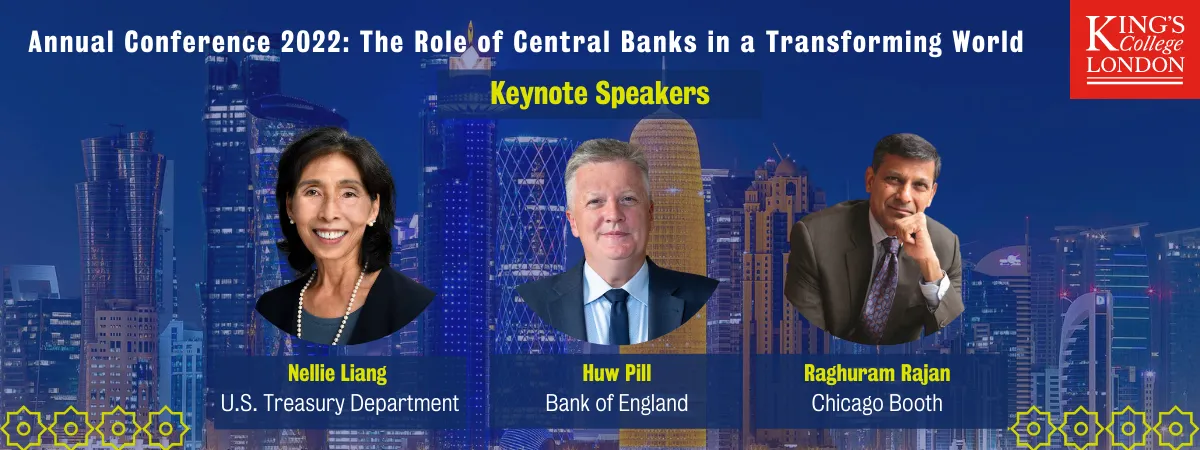
Monetary and Fiscal Policy Interactions Panel
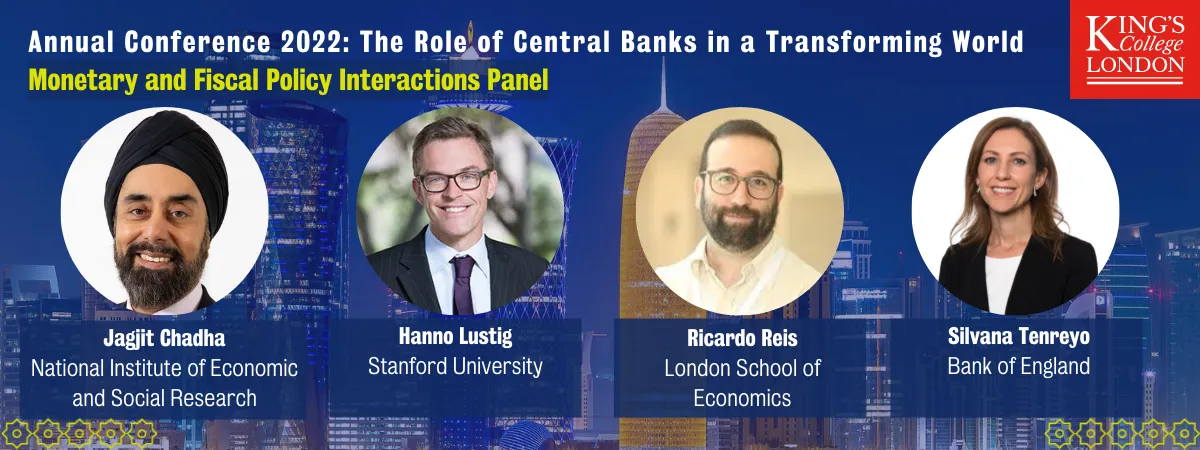
Central Bank Digital Currency Panel
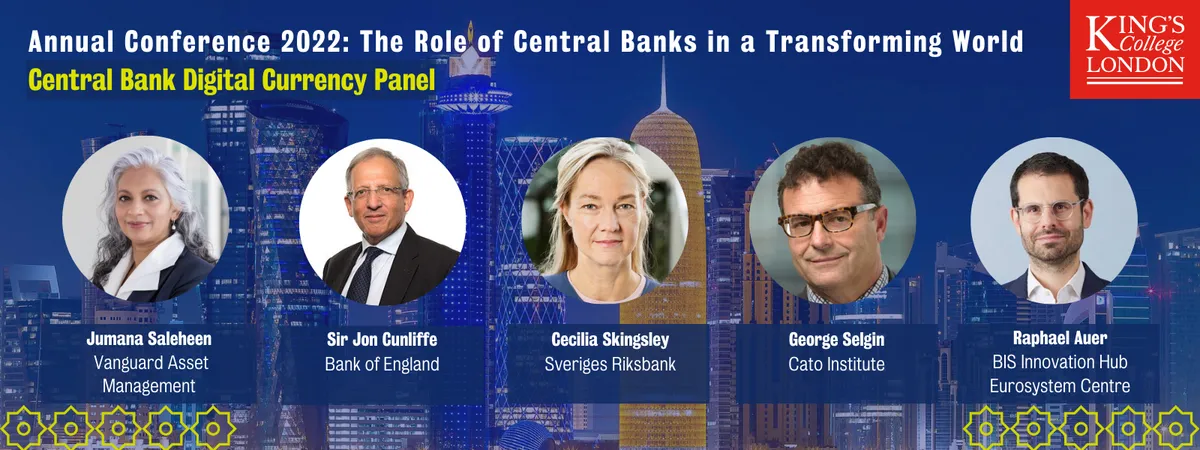
PhD Careers Workshop
As part of the conference, we will be offering a workshop aimed at economics PhD students preparing for the job market on Monday, 4 July 2022. The workshop will consist of an afternoon of panel discussions and Q&A sessions with speakers from BlackRock, Goldman Sachs, NERA Economic Consulting, Deliveroo, Bank of England, Institute for Fiscal Studies, University of Oxford and Banque de France. Click to find out more.
Conference Registration
Conference Registrations are now closed.
Programme
A condensed version of the programme can be found here.
Day 1: Tuesday 5 July 2022
09.00 Welcome
Professor Shitij Kapur (Principal, King's College London) and Professor David Aikman (Director, Qatar Centre for Global Banking & Finance)
09.10 Keynote Address
Nellie Liang, Under Secretary of the Treasury for Domestic Finance, U.S. Treasury Department
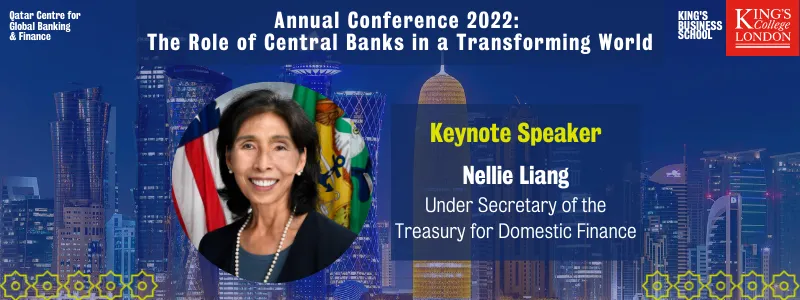
10.30 Session: Banking and Regulation
“Liquidity and Safety over the Business Cycle” by Alexander Haas (University of Oxford) & Andrea Ferrero (University of Oxford). Discussant: Matthias Rottner (Bundesbank)
“The Cross Border Effects of Bank Capital Regulation” by Saleem Bahaj (Bank of England & University College London) and Frederic Malherbe (University College London). Discussant: Rustam Jamilov (University of Oxford)
“The Geography of Bank Deposits and the Origins of Aggregate Fluctuations” by Shohini Kundu (University of California, Los Angeles), Seongjin Park (University of Chicago - Booth School of Business) & Nishant Vats (University of Chicago Booth School of Business). Discussant: Veronica Rappoport (London School of Economics)
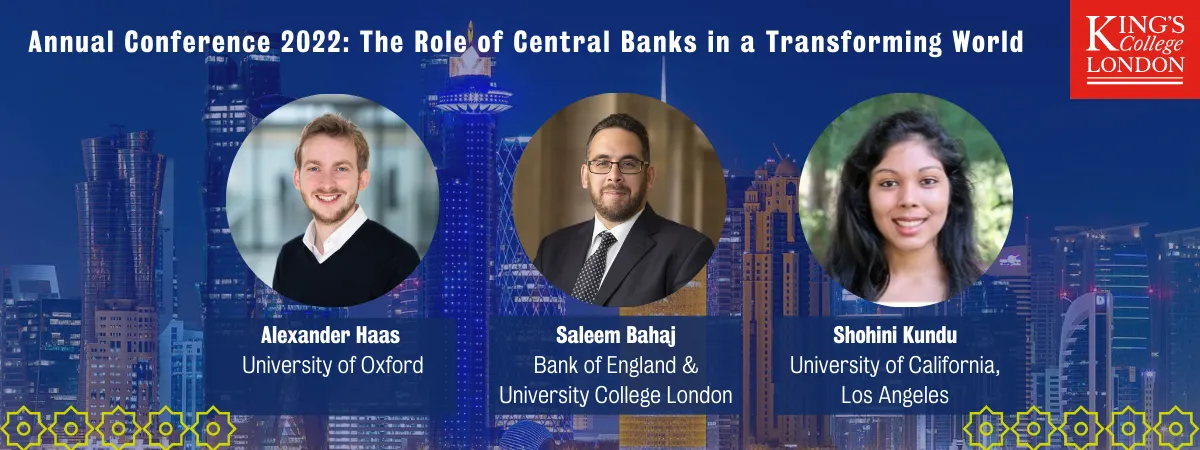
13.30 Session: Monetary Theory
“Money Talks: Information and Seignorage” by Maxi Guennewig (University of Bonn). Discussant: Tai-Wei Hu (University of Bristol)
"The Open Economy Macroeconomics of Central Bank Digital Currencies" by Marco Pinchetti (Bank of England), Michael Kumhof (Bank of England, CEPR and Centre for Macroeconomics), Phurichai Rungcharoenkitkul (Bank for International Settlements), and Andrej Sokol (European Central Bank). Discussant: Tim Jackson (University of Liverpool)

15.10 Session: Monetary Policy
“Getting in all the Cracks: Monetary Policy, Financial Vulnerabilities, and Macro Risk” by Andrea Ajello (Board of Governors of the Federal Reserve System) & Tyler Pike. Discussant: Ambrogio Cesa-Bianchi (Bank of England)
“Perceptions about Monetary Policy” by Michael Bauer (University of Hamburg), Carolin E. Pflueger, Adi Sunderam. Discussant: Ilaria Piatti (Queen Mary University of London)
"Government Debt Management and Inflation with Real and Nominal Bonds" by Vytautas Valaitis (European University Institute), Lukas Schmid (University of Southern California) & Alessandro T. Villa (Federal Reserve Bank of Chicago). Discussant: Sarah Mouabbi (Banque de France)
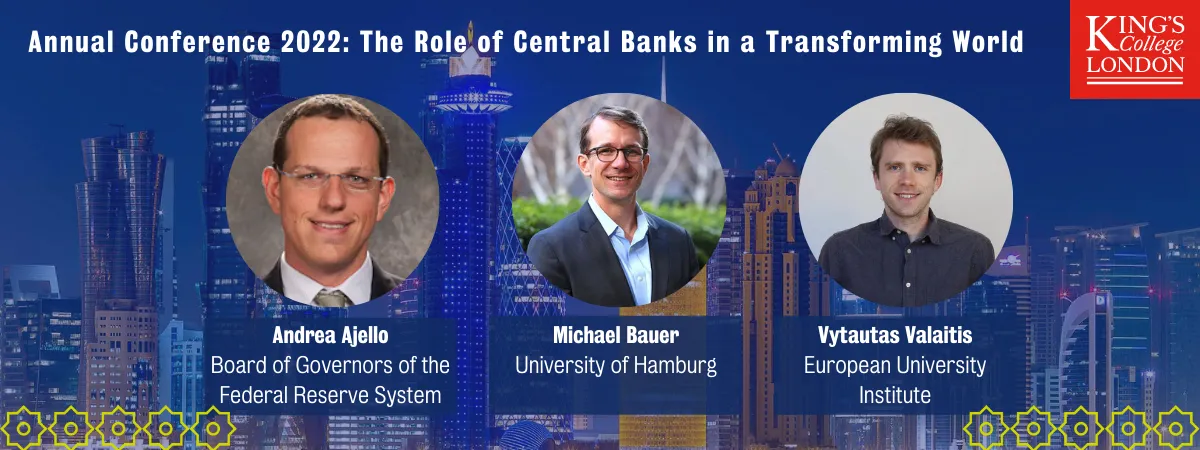
17.30 Panel: Monetary and Fiscal Policy Interactions
Chair: Jagjit Chadha (Director, National Institute of Economic and Social Research)
Panellists: Hanno Lustig (Mizuho Financial Group Professor of Finance, Stanford University), Ricardo Reis (A.W. Phillips Professor of Economics, London School of Economics), Silvana Tenreyo (External Member, Monetary Policy Committee, Bank of England)

18.40 Young Economist Prize Ceremony
Finalists:
- David Xiaoyu Xu, University of Texas at Austin: Financial Market Structure and the Supply of Safe Assets: An Analysis of the Leveraged Loan Market
- Elizaveta Sizova, KU Leuven: Banks' Next Top Model
- Fabian Seyrich, Diw, Berlin School of Economics: A Behavioral Heterogeneous Agent New Keynesian Model
- Fabricius Somogyi, University of St. Gallen: Dollar Dominance in FX Trading
- Ghassane Benmir, London School of Economics: Policy Interaction and the Transition to Clean Technology
- Hillary Stein, Harvard University: Got Milk? The Effect of Export Price Shocks on Exchange Rates
- Niklas Schmitz, University of Cambridge: The Downside Risk Channel of Monetary Policy
19.00 Reception and Poster Discussions
- “Heterogeneous information, subjective model beliefs, and the time-varying transmission of shocks” by Alistair Macaulay (University of Oxford)
- “Fintech Entry, Firm Financial Inclusion and Macroeconomic Dynamics in Emerging Economies” by Federico Mandelman (Federal Reserve Bank of Atlanta)
- “Learning and Misperception of Makeup Strategies” by James Hebden (Board of Governors of the Federal Reserve System)
- “The macroeconomic effects of temperature shocks in Europe” by Marta Maria Pisa (Sapienza University of Rome)
Day 2: Wednesday 6 July 2022
09.00 Welcome
Lord Christopher Geidt (Chair, King’s College Council) and Dr Rhys Bidder (Deputy Director, Qatar Centre for Global Banking & Finance)
09.10 Keynote Address
Huw Pill, Chief Economist and Executive Director for Monetary Analysis, Bank of England
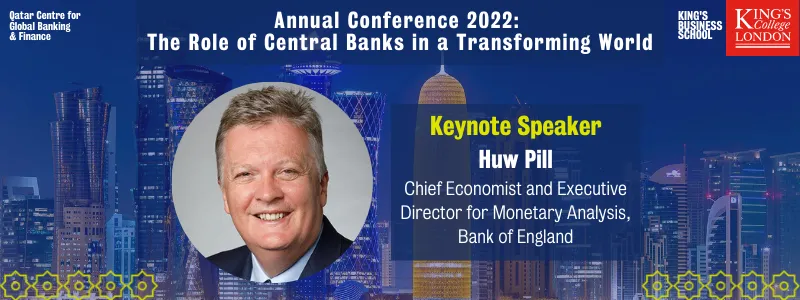
10.30 Session: Risks
“Asset Overhang and Technological Change” by Joris Tielens (National Bank of Belgium), Hans Degryse & Tarik Roukny. Discussant: Joseba Martinez (London Business School)
“Credit Horizons” by John Moore (University of Edinburgh), Nobuhiro Kiyotaki (Princeton) & Shengxing Zhang (London School of Economics). Discussant: Gabor Pinter (Bank of England)
“Endogenous Production Networks under Supply Chain Uncertainty” by Alexandr Kopytov (University of Hong Kong), Bineet Mishra (Cornell University), Mathieu Taschereau-Dumouchel (Cornell University) Kristoer Nimark (Cornell University). Discussant: Matteo Bizzarri (Bocconi University)
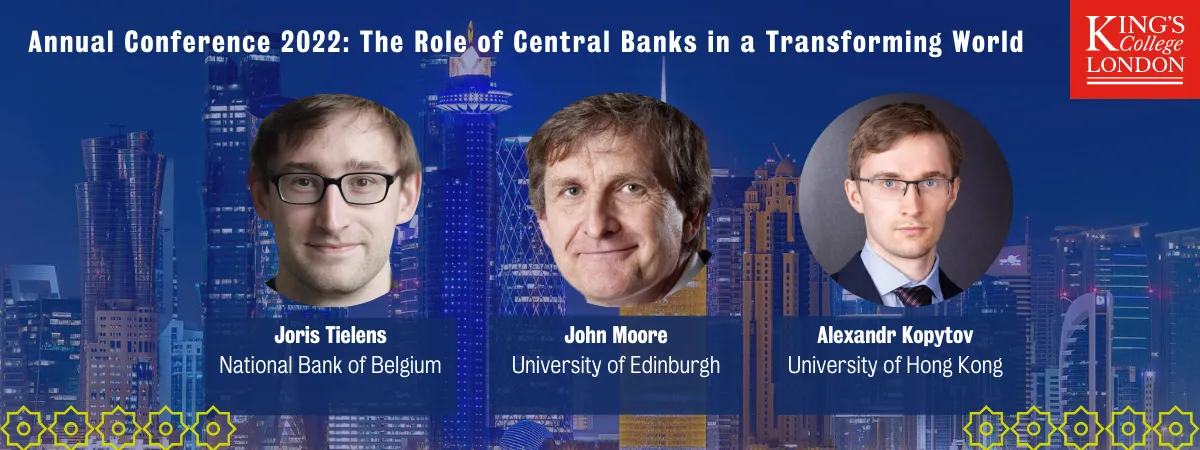
13.30 Panel: Central Bank Digital Currency
Chair: Jumana Saleheen (Chief Economist & Head of Investment Strategy Group, Vanguard Asset Management)
Panellists: Sir Jon Cunliffe (Deputy Governor, Financial Stability, Bank of England), Cecilia Skingsley (First Deputy Governor, Sveriges Riksbank), Raphael Auer (Head, BIS Innovation Hub Eurosystem Centre), George Selgin (Senior Fellow and Director Emeritus, Cato Institute, Center for Monetary and Financial Alternatives)

15.00 Keynote: Fireside Conversation
With Raghuram Rajan (Katherine Dusak Miller Distinguished Service Professor of Finance at Chicago Booth) and Professor David Aikman (Director, Qatar Centre for Global Banking & Finance)
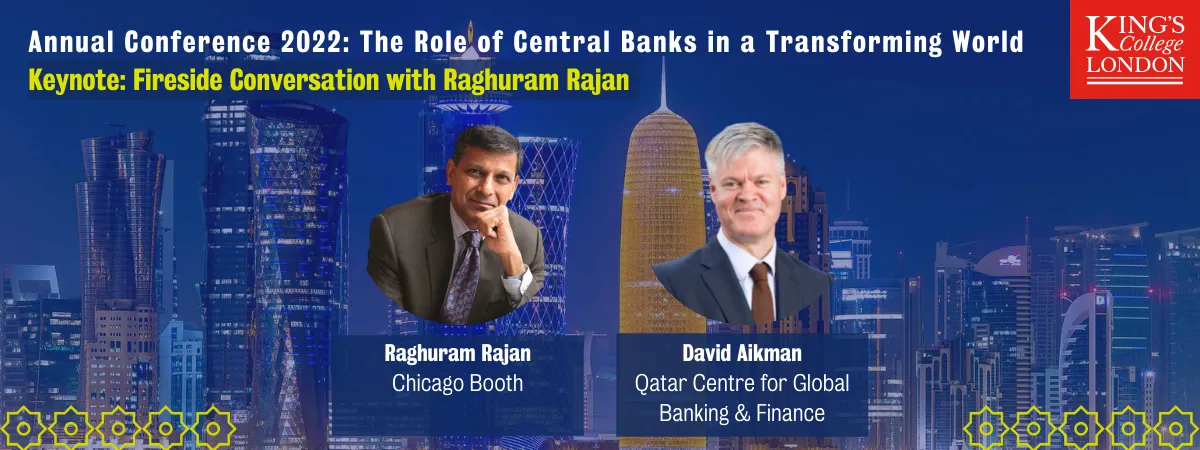
16.00 Session: Markets
“How do repo markets behave under stress? Evidence from the COVID-19 crisis” by Anne-Caroline Hüser (Bank of England), Caterina Lepore (International Monetary Fund), Luitgard Anna Maria Veraart (London School of Economics & Political Science). Discussant: Nina Boyarchenko (Federal Reserve Bank of New York)
“Demand-Supply Imbalance Risk and Long-Term Swap Spreads” by Aytek Malkhozov (Queen Mary University of London), Samuel G. Hanson, Gyuri Venter. Discussant: Dimitri Vayanos (London School of Economics)
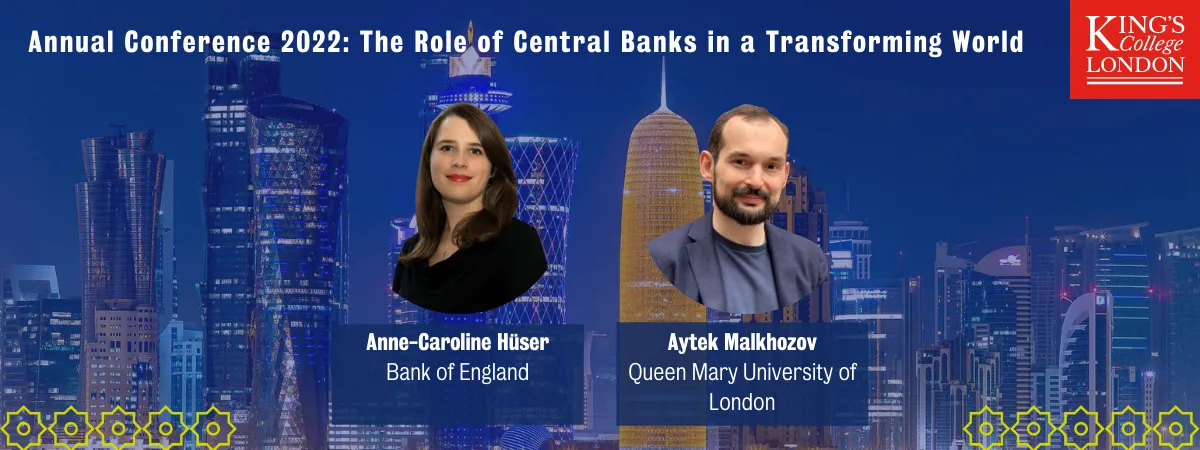
17.20 Closing Remarks
Professor Evelyn Welch (Senior Vice President, King's College London) and Professor David Aikman (Director, Qatar Centre for Global Banking & Finance)
About the Speakers
Keynotes
Nellie Liang was confirmed as the Under Secretary for Domestic Finance at the U.S. Treasury Department on July 15, 2021. Prior to serving at Treasury, Liang was a Senior Fellow in Economic Studies at the Brookings Institution. She also was a Visiting Scholar at the International Monetary Fund’s Monetary and Capital Markets Department, Lecturer at the Yale School of Management, and a member of the Congressional Budget Office’s Panel of Economic Advisors. Over three decades at the Board of Governors of the Federal Reserve System, Liang held a range of positions, including as the first Director of the Division of Financial Stability from 2010 to 2017. In that position, she oversaw the development of financial stability policies related to risks in financial firms and financial markets, and interactions of financial policies with monetary policy. Her recent research has focused on the financial system and macroeconomic growth. Liang received a Ph.D. in economics from the University of Maryland and a B.A. in economics from the University of Notre Dame.
Huw Pill is Chief Economist and Executive Director for Monetary Analysis and Research at the Bank of England. He is also a member of the Bank of England's Monetary Policy Committee. Previously, Huw was Chief European Economist at Goldman Sachs (2011-18). Before that, he worked at the European Central Bank in Frankfurt. He served as its Deputy Director of Research (2009-11) and Head of its Monetary Policy Stance Division (2004-09). And he worked in its Strategic Policy Issues unit (1998-2001). Huw was also a member of the faculty at Harvard Business School (1995-98, 2001- 04, 2019-21). At the start of his career, he worked as an economist in the Bank of England’s then Economics Division (1990-92). Huw has a BA (Hons) from the University of Oxford and an MA and PhD from Stanford University.
Raghuram Rajan is the Katherine Dusak Miller Distinguished Service Professor of Finance at Chicago Booth. He was the 23rd Governor of the Reserve Bank of India between September 2013 and September 2016. Between 2003 and 2006, Dr Rajan was the Chief Economist and Director of Research at the International Monetary Fund. Dr. Rajan is a member of the Group of Thirty. He was the President of the American Finance Association in 2011 and is a member of the American Academy of Arts and Sciences. In January 2003, the American Finance Association awarded Dr. Rajan the inaugural Fischer Black Prize for the best finance researcher under the age of 40. The other awards he has received include the Infosys prize for the Economic Sciences in 2012, the Deutsche Bank Prize for Financial Economics in 2013, Euromoney Central Banker Governor of the Year 2014, and Banker Magazine (FT Group) Central Bank Governor of the Year 2016.
Panels
Jagjit Chadha is an expert on financial markets and monetary policy, as well as aspects of monetary and financial history. Prior to joining NIESR, he was Professor of Economics at the University of Kent and at Cambridge. He has also held positions as Professor of Economics at the University of St Andrews and a Fellow at Clare College, Cambridge, as well as working at the Bank of England on Monetary Policy, as Chief Quantitative Economist at BNP Paribas, and served as Chair of the Money, Macro, Finance Study Group. During his career he has acted as Specialist Adviser to the House of Commons Treasury Committee and as an academic adviser to both the Bank of England and HM Treasury, as well as to many central banks and the Bank for International Settlements.
Jumana Saleheen, Ph.D., is chief economist and head of Vanguard Investment Strategy Group, Europe at Vanguard Asset Management. She leads a team that conducts research on the global economy, with a focus on Europe, global capital markets, and related investment topics. Jumana has extensive management and thought leadership experience, having previously served as the chief economist and head of sustainability at CRU, an economics consultancy in London. She also held several senior roles at the Bank of England, including head of division in the Financial Stability Directorate. Jumana earned a Ph.D. in economics from University College London and a B.Sc. and M.Sc. from the London School of Economics.
Sir Jon Cunliffe is the Deputy Governor for Financial Stability at the Bank of England. He is a member of the Bank’s Financial Policy and Monetary Policy Committees, the Bank’s Court of Directors and the Prudential Regulatory Committee. He has specific responsibility within the Bank of England for financial stability, for the supervision and oversight of financial market infrastructures and payment systems and for international. He is a member of the G20 Financial Stability Board Steering Committee. He is Chair of the Bank for International Settlements Committee on Payments and Market Infrastructures.
Cecilia Skingsley is First Deputy Governor at Sveriges Riksbank. She previously held the post of Chief Economist at Swedbank and has also worked at Dagens industri, ABN Amro Bank and the Ministry of Finance. She holds a BA in Economics and Political Science and a financial analyst diploma. Cecilia represents the Riksbank on the Committee on Payments and Market Infrastructures (CPMI) and on the Euro Retail Payments Board (ERPB). She is also the Governor of the Riksbank’s alternate on the General Council of the ECB and is a member of the Advisory Technical Committee (ATC) of the European Systemic Risk Board (ESRB). In addition, Cecilia chairs the retail payments council, the cash management advisory board and is a member of the Financial Stability Council.
George Selgin is a senior fellow and director emeritus of the Center for Monetary and Financial Alternatives at the Cato Institute and Professor Emeritus of Economics at the University of Georgia. He is the author of numerous academic journal articles and books, including The Theory of Free Banking (Rowman & Littlefield, 1988), Good Money: Birmingham Button Makers, the Royal Mint, and the Beginnings of Modern Coinage (University of Michigan Press, 2008), Money: Free and Unfree (The Cato Institute, 2015), and The Menace of Fiscal QE (The Cato Institute, 2019). Selgin holds a B.A. in economics and zoology from Drew University, and a Ph.D. in economics from New York University.
Hanno Lustig has worked at the intersection of macroeconomics and finance. Recently, his research has focused on understanding the forces that determine exchange rates in currency markets. His research has shown how currencies have different risk characteristics that are determined by a country’s role in the global economy. These risk characteristics help to understand the behavior of exchange rates. In addition, Lustig has explored the impact of government guarantees on the pricing of tail risk borne by large financial institutions. More recently, Lustig has also worked on understanding the determinants of a firm’s volatility (volatility of sales, cash flows, stock returns etc).
Rapheal Auer is Head of the BIS Innovation Hub Eurosystem Centre, which develops technologies to improve the functioning of the global financial system. His policy work focuses on cryptocurrencies, stablecoins and CBDC. On these topics, he also contributes to BIS policy publications and various international fora, including the G20-CPMI Cross-Border Payments Taskforce. He has published extensively in the field of international economics, monetary policy and digital currencies. Before taking up his current position, he was Principal Economist in the BIS' Innovation and Digital Economy unit, and before that, Deputy Head and Economic Advisor of the International Trade and Capital Flows unit at Swiss National Bank, Globalization and Governance Fellow at Princeton School of Public and International Affairs and visiting fellow at the Federal Reserve Bank of New York. He holds a PhD in economics from MIT and serves as president of the Central Bank Research Association.
Ricardo Reis is the A.W. Phillips Professor of Economics at the London School of Economics. Recent honors include the 2021 Yrjo Jahnsson medal, the 2017 BdF/TSE junior prize, and the 2016 Bernacer prize. He is an academic consultant at the Bank of England, the Riksbank, and the Federal Reserve System, he directs the Centre for Macroeconomics in the UK, and serves on the council or as an advisor of multiple organizations. He has published widely on macroeconomics, namely on inflation, expectations, monetary policy, monetary-fiscal interactions, public debt sustainability, inattention, business cycle models with inequality, automatic stabilizers, SBBSs, and capital misallocation in the Eurocrisis.
Silvana Tenreyro is Professor in Economics at the London School of Economics and an external member of the Monetary Policy Committee at the Bank of England. She obtained her MA and PhD in Economics from Harvard University. Before joining the Bank of England, she was co-Director and Board member of the Review of Economic Studies and Chair of the Women’s Committee of the Royal Economics Society. She is a Fellow of the British Academy (FBA). Since 1 January 2021, she is the President of the European Economic Association.
Presenters
Alexander Haas is a DPhil (PhD) student in Economics at the University of Oxford (Balliol College), working on topics in macroeconomics, macro-finance, and monetary policy. He is also a Visiting Academic at the Bank of England and teaches undergraduate and graduate students as a Stipendiary Lecturer in Economics at Trinity College (Oxford) and the Department of Economics. In 2022/2023, Alexander will be on the academic job market.
Alexandr Kopytov is an Assistant Professor of Finance at the University of Hong Kong. His research interests include financial intermediation, socially responsible investing, and macroeconomics. He received his PhD from the Wharton School at the University of Pennsylvania.
Andrea Ajello is Chief of the Macro-Financial Analysis section in the Division of Monetary Affairs at the Board of Governors of the Federal Reserve System. He was an adjunct professor at Johns Hopkins University in 2018 and taught Macroeconomic Theory in the Masters in Applied Economics program. His primary research fields are Macroeconomics, Financial Economics and Applied Econometrics.
Anne-Caroline Hüser is a Senior Research Economist at the Bank of England. She joined the Bank in October 2018. She conducts research on stress testing, financial networks, the repo market, AI in finance and models of contagion with a focus on banks and non-banks.
Aytek Malkhozov is a Reader at the Queen Mary University of London. Prior to this appointment, he worked at the Federal Reserve Board, the Bank for International Settlements, and McGill University.
John Moore is an economic theorist with an interest in the nature of contracts, and the interplay between financial markets and the rest of the economy. He was appointed to the George Watson's and Daniel Stewart's Chair of Political Economy at the University of Edinburgh in 2000. Previously, in 1983, he was appointed to the London School of Economics, where in 1990 he became Professor of Economic Theory, a position he still holds. In 2018, Moore was appointed David Hume University Chair of Economics. He was the 2010 President of the Econometric Society. He is a Fellow of the British Academy, the Econometric Society, the European Economic Association and the Royal Society of Edinburgh. He is a Foreign Honorary Member of the American Academy of Arts and Sciences and the American Economic Association.
Joris Tielens obtained his PhD in economics at KU Leuven in 2019. During his studies, he was a visiting scholar at the European Central Bank. He is currently an economist at the research department of the National Bank of Belgium where he also takes up an advising role on the Bank’s macroprudential policies. His research interests include (real effects of) financial intermediation, banking/production networks, and macroeconomic modelling. He has published on these topics in various leading academic journals.
Marco Pinchetti is a Research Economist in the International Directorate of the Bank of England. He holds a MSc from Politecnico di Milano and a PhD in Economics from ECARES, Universite’ Libre de Bruxelles. His main research interests concern central bank communication, the international spillovers of monetary policy, and the economics of central bank digital currencies and crypto-currencies.
Maxi Guennewig is a postdoctoral researcher/lecturer in the Finance Group at the University of Bonn’s economics department, having completed his PhD at the LSE in 2021. Maxi is interested in monetary economics and finance, with a focus on banking and digital currencies.
Michael Bauer is a Professor of Economics at Universität Hamburg, and a research fellow at CEPR, CESifo, and the IMFS. His research focuses on the role of financial markets in the macroeconomy, monetary policy, and climate change. He is interested in understanding the effects of monetary policy on the yield curve and asset prices—including monetary policy surprises, forward guidance, monetary policy communication, quantitative easing, monetary policy uncertainty, and risks to the economic outlook. More recently, he has been working on social discount rates, the social cost of carbon and climate finance.
Saleem Bahaj is an Associate Professor of Economics and Finance at University College London. He joined UCL in 2021 after spending seven years in the research department of the Bank of England and completing his PhD at the University of Cambridge in 2014. Saleem's research lies at the intersection of macroeconomics and finance with a particular focus on international finance, corporate behaviour and bank capital regulation. His most recent work has focused on the coordination of financial policies between countries. Saleem’s work has been published in, among others, the American Economic Review, the Review of Economic Studies and the Journal of Finance.
Shohini Kundu is an Assistant Professor of Finance at the Anderson School of Management at University of California, Los Angeles. Her research focuses on financial intermediation, regulation, corporate finance and macroeconomics. She was a runner-up in the Qatar Centre for Global Banking & Finance’s first-ever Young Economist Prize Competition in 2021. She was a finalist in the ECB’s Young Economists’ Competition and received the BlackRock Applied Research Award, WFA Award for Outstanding Research, Eugene F. Fama Fellowship, and Stigler Center Dissertation Award for her doctoral work. She holds a PhD in Finance and MBA from the University of Chicago Booth School of Business, and a BA in Economics from Cornell University.
Vytautas Valaitis is a macroeconomist working on questions related to fiscal policy, labour and finance. He is currently a Max-Weber fellow at the European University Institute and will be a faculty member at the University of Surrey from Fall 2022. Vytautas holds a PhD from Duke University and a master's degree from the Central European University.
Event details
Bush House
Strand campus, 30 Aldwych, London, WC2B 4BG
